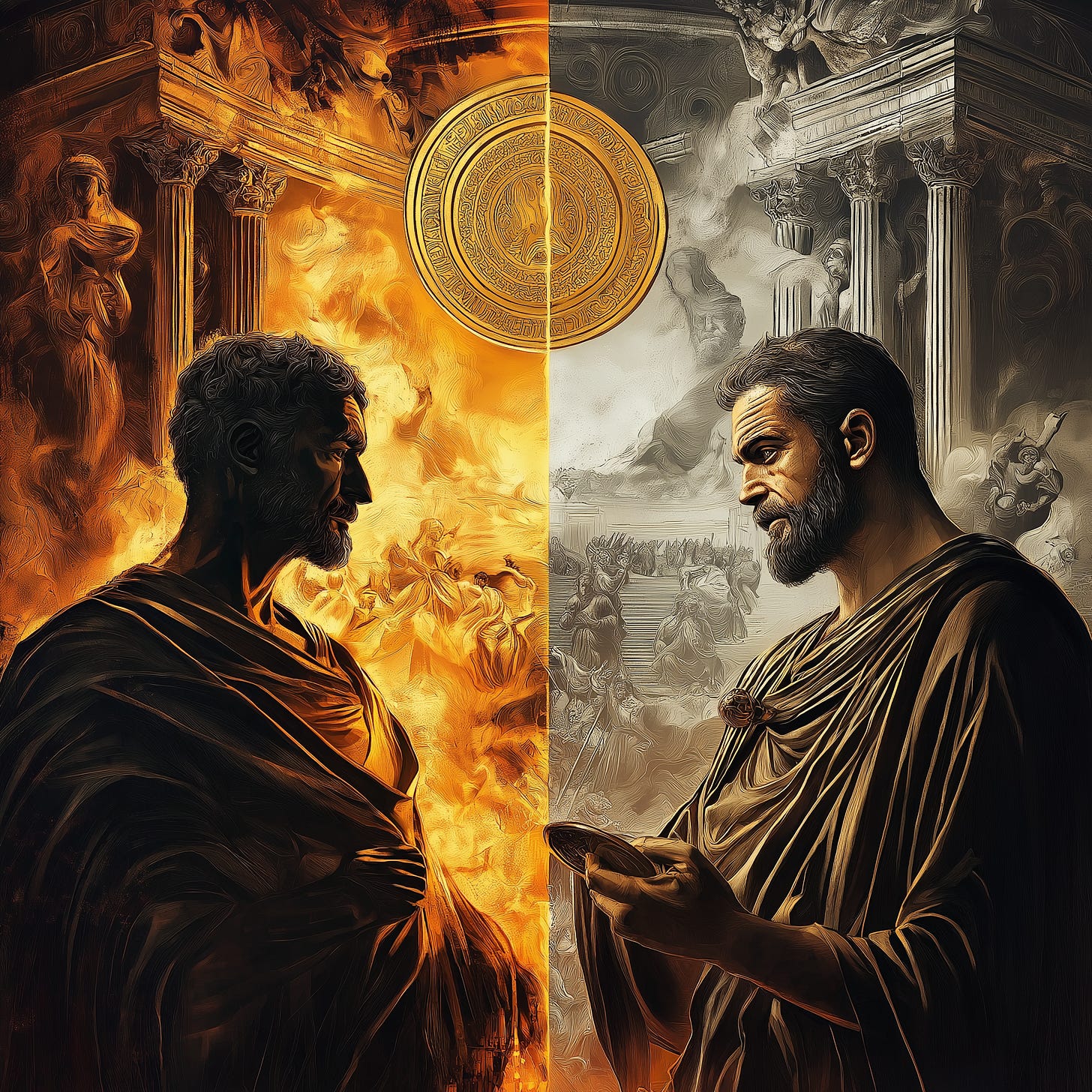Forgotten Letters of History: Machiavelli
To His Imperial Majesty Marcus Aurelius
this is a work of fiction
To His Imperial Majesty Marcus Aurelius,
From Niccolò Machiavelli, Former Secretary of the Florentine Republic
Most Philosophical Emperor,
I write to you across the vast expanse of time, having read accounts of your reign and reflections that attempt to unite our seemingly disparate wisdom. While these modern writers show some understanding, they miss the most crucial point – the foundation of our different perspectives on power.
You see, Most Serene Emperor, you never had to seize your power. Ah! There lies the essential difference between us! You inherited the most magnificent empire the world had ever known, carefully prepared for you by your predecessors, particularly the divine Hadrian and your own father, Antoninus Pius. Your challenge was to maintain power while remaining virtuous – no small feat, I grant you, but fundamentally different from having to seize and establish control in the first place.
Consider this, O Emperor: What would you have done if, like my prince Cesare Borgia, you had needed to carve out your authority from chaos? If every senator was a potential usurper, every general a would-be emperor? If the plague had struck not when you were secure in power but when you were trying to establish it?
I find it interesting how these modern writers praise your handling of the Antonine Plague. Indeed, your actions were both wise and effective. But permit me to observe – you could afford to be both! Your power was secure enough to balance competing interests, consider the greater good, and take the longer view. Borgia, fighting for survival in the Romagna, had no such luxury!
And yet... and yet...
Here is what truly intrigues me, O Marcus Aurelius: Would your philosophy have survived first contact with the desperate need to establish power? Or would you, like many others I observed in my time, have found that necessity knows no philosophy?
Don't misunderstand me – I deeply admire your unwavering principles. Indeed, I find myself nodding along with many of these modern writers' observations about the value of philosophical foundation. But they miss the crucial distinction between maintaining power and seizing it. It is one thing to remain unmoved by power once you have it; it is quite another to remain unmoved while fighting to achieve it.
This brings me to my most pointed question: What would you have done, Most Philosophical Emperor, if maintaining your principles meant losing power to someone without them? If your philosophical detachment meant the empire falling to a tyrant? Would you have sacrificed your principles to maintain control for the greater good? Or would you have maintained your principles at the cost of the empire?
We never got to see the answer, did we? Fortune – or Fortuna, as I prefer to call her – never presented you with that particular test. How convenient for philosophy! How convenient for posterity! They can praise your principles without ever having to see them tested in the crucible of necessity!
But let us be fair – you faced other tests, and you faced them well. The plague, the wars, the constant challenges of empire... You maintained principle and effectiveness in situations where many would have abandoned one or the other. This, I readily acknowledge, is no small achievement and a testament to your wisdom and leadership.
Here lies the proper synthesis these modern writers seek: Not between your philosophy and my pragmatism in general, but in understanding that different situations demand different approaches. Maintaining power allows for philosophy in a way that seizing it rarely does. The established prince can afford principles that the ascending prince cannot.
Yet I wonder... Do you see the irony, O Emperor? Your success in maintaining power while keeping your principles depended on the less philosophical actions of your predecessors, who established and secured that power in the first place! Augustus was no Stoic when he established the principate, was he?
Still, I acknowledge that your example proves something I perhaps underemphasized in my writings: that once power is secured, principles can help maintain it. Your reign demonstrates that philosophical wisdom, properly applied, can be a source of strength, not weakness – provided one's power is already established.
What a stimulating conversation we could have had, you and I, over a flask of good Tuscan wine! I would have loved to press you on these points to see how you would defend your philosophy against my practical objections! But perhaps these modern writers are right about one thing – possibly our views do complement each other, each applying best to different circumstances of power.
With great respect and eternal fascination,
Niccolò Machiavelli
Former Secretary of the Florentine Republic
P.S. – I note with some amusement that your son Commodus proved my point about inherited virtue rather conclusively, didn't he? But that could be a discussion for another letter...



Maybe Talleyrand represented some of the qualities. Ruthless, selfish, self-absorbed, very cynical and pragmatic, but when the times called his principles led him to decisions (and manipulations) that maintained peace in Europe for 100 years after the Vienna 1815 congress.
Your best yet!
States are maintained by the ideals upon which they were created. Tomas Garrigue Masaryk.
In the short term politics is what decides. In the medium term it's economy. In the long run, it's culture.
I agree - the world needs a leader which is a practical philosopher of Aurelius/Masaryk kind - the synthesis of theory and practice. But as Reto Berra stated in his koan: In theory, theory and practice are the same. But in practice - they aren't!!!
How rare are those philosopher kings? And is our system meritocratic enough, that such people can rise to become leaders?